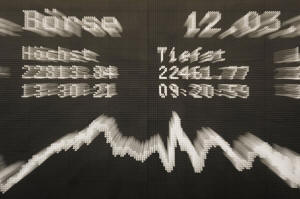World shares are mixed after rebound on Wall St as investors await next
steps in trade wars
[March 13, 2025] By
ELAINE KURTENBACH
BANGKOK (AP) — World shares were mixed on Thursday after a rebound on
Wall Street fueled by an encouraging update on U.S. consumer prices.
That report showed overall prices rose less for U.S. consumers last
month than economists expected. Thursday will bring an update on
wholesale prices.
Germany's DAX lost 0.2% to 22,637.98, while the CAC 40 in Paris rose
0.4% to 7,992.91. Britain's FTSE 100 also added 0.4%, to 8,574.35.
The future for the S&P 500 lost 0.2% while that for the Dow Jones
Industrial Average fell 0.1%.
Chinese markets led a broad decline in Asia as investors watched for the
next steps in President Donald Trump’s trade war. Hong Kong's Hang Seng
index shed 0.6% to 23,462.65, while the Shanghai Composite index lost
0.4% to 3,358.73.
Tokyo's Nikkei 225 gave up early gains to close 0.1% lower at 37,790.03.
South Korea's Kospi edged 0.1% lower, to 2,573.64. In Australia, the
S&P/ASX 200 lost 0.5% to 7,749.10.
Taiwan's Taiex shed 1.4% and the Sensex in India edged 0.1% lower.
Bangkok's SET rose 0.1%.
On Wednesday, the S&P 500 gained 0.5%, a day after the index briefly
fell more than 10% below its all-time high set last month.
The Dow industrials fell 0.2% and the Nasdaq composite climbed 1.2%.

Companies in the artificial-intelligence industry led gains, bouncing
back after AI stocks got crushed recently by worries their prices had
gone too stratospheric.
Nvidia climbed 6.4% to trim its loss for the year so far to 13.8%.
Server-maker Super Micro Computer rose 4%, and GE Vernova, which is
helping to power AI data centers, gained 5.1%.
Elon Musk’s Tesla, whose price had more than halved since mid-December,
rallied 7.6% for its first back-to-back gain in nearly a month.
But more stocks in the S&P 500 fell than rose. Among the hardest hit
were businesses that could be set to feel pain because of Trump’s trade
war.
[to top of second column] |

The German stock index, DAX, is pictured at the stock market in
Frankfurt, Germany, Wednesday, March 12, 2025. (AP Photo/Michael
Probst)
 The question hanging over markets is
how much pain Trump will let the economy endure through tariffs and
other policies.
Even if Trump ultimately goes with milder tariffs, damage could
still be done. The dizzying barrage of on -again, off -again
announcements on tariffs has already begun sapping confidence among
U.S. consumers and businesses by ramping up uncertainty. That could
cause U.S. households and businesses to spend less, hurting the
economy.
On Tuesday, for example, Trump said he would double 25% tariffs
announced on Canadian steel and aluminum, only to walk it back later
in the day after a Canadian province pledged to drop a retaliatory
measure that had incensed Trump.
Some U.S. businesses say they’ve already begun seeing a change in
behavior among their customers.
Wednesday’s inflation report came at a time when worries are
mounting that Trump’s tariffs will drive prices even higher as U.S.
importers pass on their costs to their customers.
It’s also helpful for the Federal Reserve, which had been cutting
interest rates last year to boost the economy before pausing this
year, partly because of concerns about stubbornly high inflation.
In other dealings early Thursday, U.S. benchmark crude oil lost 37
cents to $67.31 per barrel. Brent crude, the international standard,
gave up 29 cents to $70.66 per barrel.
The U.S. dollar fell to 148.16 Japanese yen from 148.25 yen. The
euro fell to $1.0873 from $1.0887.
All contents © copyright 2025 Associated Press. All rights reserved
 |